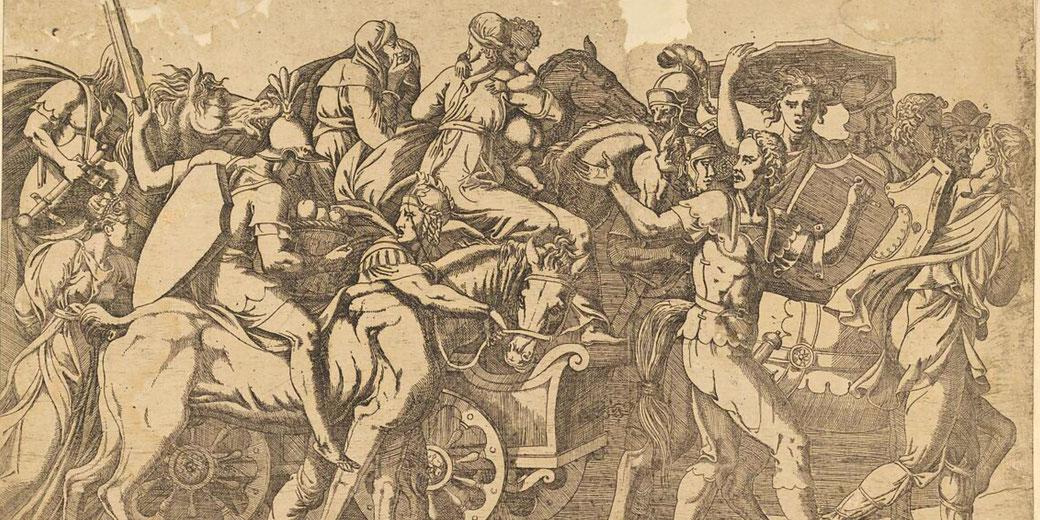How the ancient Romans declared war

The act of war in ancient Rome was a spectacle of ritual and authority. In the Roman Republic and later the Empire, the declaration of war had developed a series of complex ceremonies that blended law, religion, and politics.
The use of solemn rituals performed by the fetial priests sought to justify its conflicts and maintain a veneer of piety.
This blend of ritual and formality in declaring war exemplified Rome’s unique approach to conflict.
The strange religious ritual Rome used to declare war
The ritual of the fetial priests was a solemn and intricate process integral to Roman declarations of war.
These priests, drawn from the patrician class, played a significant role in maintaining Rome’s religious and legal standards.
The fetial priests' primary duty was to perform rituals that sought the gods' approval before any military action.
By following these traditions, they ensured that Rome's wars were just and sanctified.
Although there were times, particularly in the later years of the Empire, these were traditions conveniently ignored for political reasons.
According to Livy, the earliest recorded instance of the fetial rites being used to declare war occurred during Rome’s conflict with Fidenae, a city near the Tiber River, in the 7th century BCE.
A key part of their responsibilities of the fetial priests included the clarigatio, a formal demand for restitution presented to the enemy.
In the initial stages of the ritual, the fetial priests would select a member known as the pater patratus.
This particular priest acted as the official representative of Rome and traveled to the enemy’s territory.
Once there, he would declare Rome’s grievances and demand satisfaction or clarigatio. If the demands were ignored or refused, the ritual would continue.
After a specified waiting period, usually 33 days, the priests returned to Rome.
What role did the Roman Senate play in declaring war?
The Senate was composed of Rome’s most powerful and influential men who held the authority to debate and approve military actions.
This deliberative body ensured that decisions to go to war were carefully considered and backed by the Republic’s leading statesmen.
During the debates, senators discussed the merits and potential consequences of going to war. After extensive debate, a vote would generally be taken to decide whether to proceed with the war.
This process ensured that the decision was not made lightly and that it had the support of Rome’s political elite. The Senate’s approval was vital, as it represented the collective will of the Republic’s governing body.
Upon receiving the Senate’s approval, consuls and other military leaders were empowered to act. Consuls, elected annually, held the highest military authority in Rome and were responsible for leading the armies.
They could mobilize legions and prepare for the impending conflict.
The formal declaration of war
Once the Senate had given its approval, the next step involved informing the enemy and the Roman populace. At the Temple of Bellona, a deity associated with war, the fetial priests would conduct a solemn ceremony by throwing a spear into enemy territory.
In this ritual, the spear was cast into a piece of land specially designated to represent enemy soil, which was a symbolic act of aggression.
This act signaled Rome's readiness to engage in warfare with divine and legal justification.
During this solemn event, the fetial priests invoked the gods, asking for their favor and support in the impending conflict.
It aimed to ensure that the war had divine endorsement, which was crucial for maintaining public morale and religious propriety.
After this ritual, the war was considered officially declared, and preparations for battle could begin in earnest.
How Rome mobilized its men
Following the formal declaration, consuls and military leaders organized the legions and strategized for the campaign. In Rome, public assemblies were held to inform the citizens of the decision and its justification.
By gathering in places like the Forum, the people learned about the reasons for the war and the expectations for the conflict.
These assemblies were held to rally public support and ensure that the citizens were fully aware of the Senate's decision.
In addition to informing the public, Rome often sent envoys to the enemy to deliver formal declarations. These envoys traveled to the enemy’s capital or main stronghold to communicate Rome’s grievances and the decision to go to war.
This was considered crucial for adhering to the protocols established by the fetial priests. So, by ensuring that the enemy received the declaration, Rome upheld its commitment to a fair and justified war.
Throughout the conflict, the fetial priests continued their involvement by overseeing sacrifices and interpreting omens.
These activities were vital in maintaining divine favor and ensuring the moral high ground for Rome’s military endeavors.
The priests would sometimes accompany Roman generals to the battlefield to perform these rituals. By integrating religious duties with military campaigns, the fetial priests reinforced the sacred nature of Roman warfare.
What do you need help with?
Download ready-to-use digital learning resources
Copyright © History Skills 2014-2025.
Contact via email
With the exception of links to external sites, some historical sources and extracts from specific publications, all content on this website is copyrighted by History Skills. This content may not be copied, republished or redistributed without written permission from the website creator. Please use the Contact page to obtain relevant permission.





